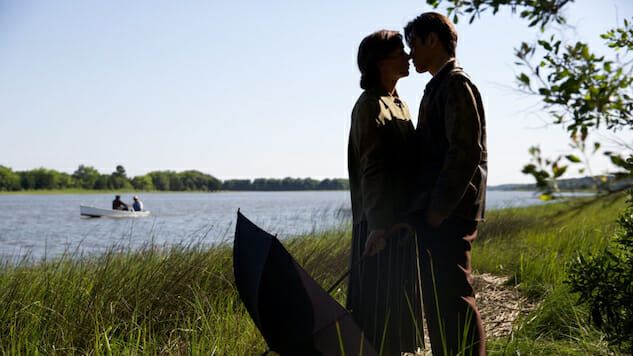The sort of polite, refined, emotionally even-keeled adult drama that one could imagine comfortably slotting in Bruce Beresford’s mid-1990s filmography, Sophie and the Rising Sun is a movie caught halfway between wartime homeland drama and interracial romance, and not particularly satisfying as either. Based on Augusta Trobaugh’s 2001 novel of the same name, but lacking much in the way of insight or distinguishing characterizations, director Maggie Greenwald’s film is ballasted by ample amounts of empathy and earnestness, but also weighed down by unpersuasive and only fitful dramatic engagement.
Set in the autumn of 1941, in the days leading up to and following the Japanese attack on Pearl Harbor, Sophie and the Rising Sun unfolds in Salty Creek, a sleepy, provincial South Carolina fishing village. When a mysterious stranger, Grover Ohta (Takashi Yamaguchi), shows up in town badly beaten, widower Anne Morrison (Margo Martindale) takes him in. Living with Anne and her housekeeper, Salome Whitmore (Lorraine Toussaint), Grover works as her gardener—a task for which he immediately proves himself well qualified. To a subset of gossipy neighbors, though, Grover is just “the Chinaman”—never mind the fact he is actually Japanese-American.
Over time, Grover bonds with Sophie Willis (Julianne Nicholson), sharing a mutual love of painting and figure sketching. After Pearl Harbor, however, Grover becomes the target of violent lashing out. Fearing for his safety, Anne secrets Grover away and perpetuates a falsehood that she put him on a bus out of town. But when she breaks her ankle and can’t effectively look out for him, Grover’s future becomes shady.
A Sundance Film Festival 2016 presentation, Sophie and the Rising Sun will inevitably draw comparisons to fellow interracial dramas Loving, a recent Oscar nominee for Ruth Negga’s lead performance, as well as the forthcoming A United Kingdom. It can sometimes be hard to pin down why one movie captures audience attention and taps into a larger zeitgeist and another, similarly themed work fails to take off. In the case of Greenwald’s film, it is not difficult.
While it arguably lacks the art-house punch of those films in terms of its cast, the story is also a work of fiction rather than based on a true story. Most bluntly, though, the movie is not Hallmark-y enough in direct, spoon-fed emotionalism to connect with those seeking feel-good, humanistic pablum. Its drama feels programmed and largely inert, with the exception of a couple discrete scenes here and there.
Greenwald has evidenced a touch with romantic lyricism before, most notably in 2000’s Songcatcher. But her screenplay adaptation fails to deliver characters with more than thumbnail depth. Anne’s motivations are never more than two-dimensional, and the same can be said for the film’s romance. Late in the movie, there’s a remarkable scene with Nicholson and Toussaint (Orange Is the New Black), and it underscores the missed opportunity to more greatly explore the discrimination and violence that Grover encounters in comparison with the African-American experience in the South.
On a technical level, Sophie and the Rising Sun is an attractive, low-budget package. Cinematographer Wolfgang Held communicates a separation of worlds (a shot with Salome arranging tea cups in the foreground, with a rack focus to Anne talking with a busybody neighbor in the background) in a way that the script struggles to delineate. And even if composer David Mansfield’s string-heavy score might come across as oppressive, it is pleasingly evocative and redolent of a bygone era.
The film’s supporting performances are more interesting than its lead turns. Martindale straps the material to her back as best she can, seeding her generosity with exasperation. Diane Ladd, meanwhile, seemingly specializes as of late in characters who teeter on the edge of hysteria, making things uncomfortable for everyone around them, and in this regard her turn here is a successful one. Yamaguchi and Nicholson, however, read as a bit blank, unable to cook up a compelling chemistry.
While the film’s inclusion of bigotry and racial animus wrapped up in the guise of prefab patriotism will strike an uncomfortably timely and resonant chord for some viewers, Sophie and the Rising Sun unfortunately doesn’t scrape down deep enough to deliver distinctive characters and drama. Lost in a haze of good intentions, its sunrise isn’t a memorable one. If you’ve ever read a dime-store romance novel, you know where this material is headed.
Director: Maggie Greenwald
Writer: Maggie Greenwald, based on Augusta Trobaugh’s novel
Starring: Julianne Nicholson, Takashi Yamaguchi, Margo Martindale, Diane Ladd, Lorraine Toussaint, Joel Murray, Karen Wheeling Reynolds
Release Date: Jan. 27, 2017
